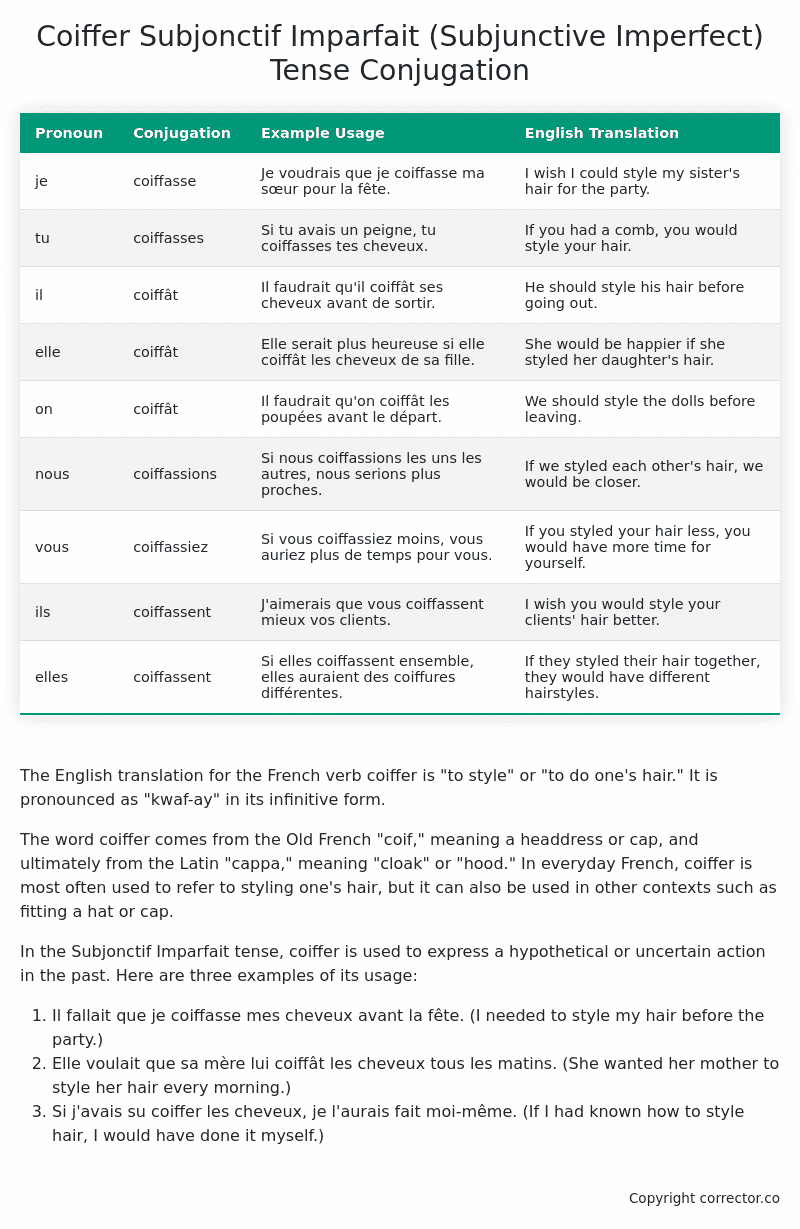Subjonctif Imparfait (Subjunctive Imperfect) Tense Conjugation of the French Verb coiffer
Introduction to the verb coiffer
The English translation for the French verb coiffer is “to style” or “to do one’s hair.” It is pronounced as “kwaf-ay” in its infinitive form.
The word coiffer comes from the Old French “coif,” meaning a headdress or cap, and ultimately from the Latin “cappa,” meaning “cloak” or “hood.” In everyday French, coiffer is most often used to refer to styling one’s hair, but it can also be used in other contexts such as fitting a hat or cap.
In the Subjonctif Imparfait tense, coiffer is used to express a hypothetical or uncertain action in the past. Here are three examples of its usage:
- Il fallait que je coiffasse mes cheveux avant la fête. (I needed to style my hair before the party.)
- Elle voulait que sa mère lui coiffât les cheveux tous les matins. (She wanted her mother to style her hair every morning.)
- Si j’avais su coiffer les cheveux, je l’aurais fait moi-même. (If I had known how to style hair, I would have done it myself.)
Table of the Subjonctif Imparfait (Subjunctive Imperfect) Tense Conjugation of coiffer
| Pronoun | Conjugation | Example Usage | English Translation |
|---|---|---|---|
| je | coiffasse | Je voudrais que je coiffasse ma sœur pour la fête. | I wish I could style my sister’s hair for the party. |
| tu | coiffasses | Si tu avais un peigne, tu coiffasses tes cheveux. | If you had a comb, you would style your hair. |
| il | coiffât | Il faudrait qu’il coiffât ses cheveux avant de sortir. | He should style his hair before going out. |
| elle | coiffât | Elle serait plus heureuse si elle coiffât les cheveux de sa fille. | She would be happier if she styled her daughter’s hair. |
| on | coiffât | Il faudrait qu’on coiffât les poupées avant le départ. | We should style the dolls before leaving. |
| nous | coiffassions | Si nous coiffassions les uns les autres, nous serions plus proches. | If we styled each other’s hair, we would be closer. |
| vous | coiffassiez | Si vous coiffassiez moins, vous auriez plus de temps pour vous. | If you styled your hair less, you would have more time for yourself. |
| ils | coiffassent | J’aimerais que vous coiffassent mieux vos clients. | I wish you would style your clients’ hair better. |
| elles | coiffassent | Si elles coiffassent ensemble, elles auraient des coiffures différentes. | If they styled their hair together, they would have different hairstyles. |
Other Conjugations for Coiffer.
Le Present (Present Tense) Conjugation of the French Verb coiffer
Imparfait (Imperfect) Tense Conjugation of the French Verb coiffer
Passé Simple (Simple Past) Tense Conjugation of the French Verb coiffer
Passé Composé (Present Perfect) Tense Conjugation of the French Verb coiffer
Futur Simple (Simple Future) Tense Conjugation of the French Verb coiffer
Futur Proche (Near Future) Tense Conjugation of the French Verb coiffer
Plus-que-parfait (Pluperfect) Tense Conjugation of the French Verb coiffer
Passé Antérieur (Past Anterior) Tense Conjugation of the French Verb coiffer
Futur Antérieur (Future Anterior) Tense Conjugation of the French Verb coiffer
Subjonctif Présent (Subjunctive Present) Tense Conjugation of the French Verb coiffer
Subjonctif Passé (Subjunctive Past) Tense Conjugation of the French Verb coiffer
Subjonctif Imparfait (Subjunctive Imperfect) Tense Conjugation of the French Verb coiffer (this article)
Subjonctif Plus-que-parfait (Subjunctive Pluperfect) Tense Conjugation of the French Verb coiffer
Conditionnel Présent (Conditional Present) Tense Conjugation of the French Verb coiffer
Conditionnel Passé (Conditional Past) Tense Conjugation of the French Verb coiffer
L’impératif Présent (Imperative Present) Tense Conjugation of the French Verb coiffer
L’infinitif Présent (Infinitive Present) Tense Conjugation of the French Verb coiffer
Struggling with French verbs or the language in general? Why not use our free French Grammar Checker – no registration required!
Get a FREE Download Study Sheet of this Conjugation 🔥
Simply right click the image below, click “save image” and get your free reference for the coiffer Subjonctif Imparfait tense conjugation!

Coiffer – About the French Subjonctif Imparfait (Subjunctive Imperfect) Tense
Formation
Common Everyday Usage Patterns
Interactions with Other Tenses
Subjonctif Présent
Indicatif Passé Composé
Conditional
Conditional Perfect
Summary
I hope you enjoyed this article on the verb coiffer. Still in a learning mood? Check out another TOTALLY random French verb conjugation!


